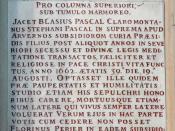Blaise Pascal's "The Wager" is not an argument for the existence of God but rather an argument as to why one should believe in the Christian God. It may seem like a good idea but in my opinion Pascal fails to make a valid argument. In the following essay I will present a summary of "The Wager" and present a few explanations as to why I think it is not a good idea to take the wager. There are many more reasons why it is not a good idea but I will mainly focus on those that I think are the strongest.
I view "The Wager" as being divided into two main parts. In the first part we see Pascal argue that both the nature and the existence of God are beyond the understanding of the human mind. He states that while faith can lead us to God he is much too infinite and unlike us so it is impossible for humans to know whether or not he exists.
This, he says, clears Christians of not having proof of God. Then he deals with the matter of those who do not believe in God. To them he offers a wager, which states that since we cannot know whether God exists but it would be most beneficial to believe in him considering the following possibilities; if God does exist and you believe in him then you will go to heaven and exist in eternal happiness. If God does not exist and you believe in him then you lose nothing. If God does exist and you do not believe in him then you will go to hell and be punished for eternity. And finally, if God does not exist and you do not believe in him you, once again, lose nothing.



Very Good
This is a well written essay and very information.
4 out of 4 people found this comment useful.